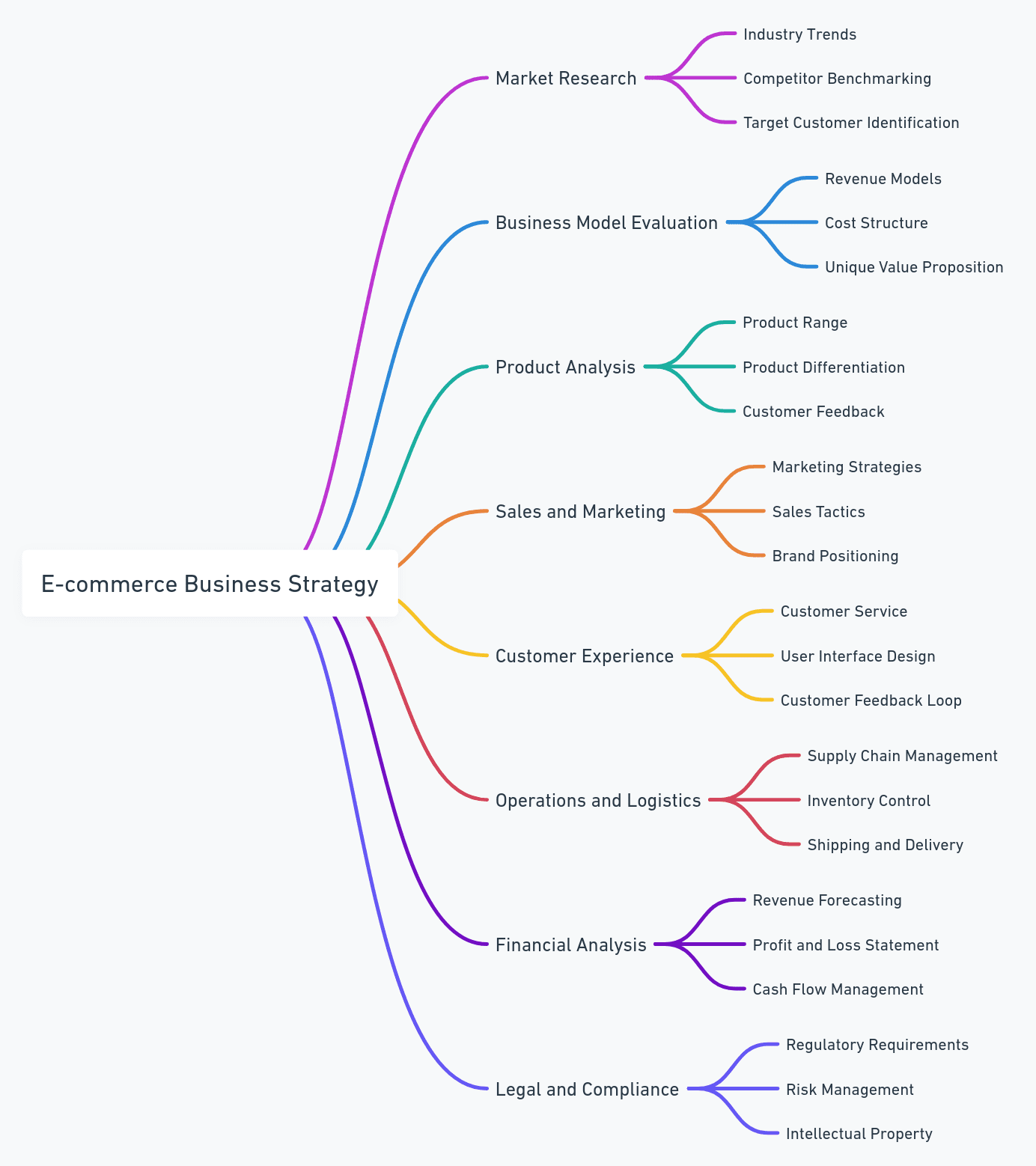Welcome to my latest blog. Here, I am compiling key points about starting a business and making your existing business successful. Below I am also providing you a tree diagram to conclude the points.
As we all know, in the fast-paced world of e-commerce, staying ahead means not just keeping up with trends but anticipating them. A comprehensive business strategy that encompasses all facets of the digital retail environment is essential. Here, we will dive into the critical areas every e-commerce business should evaluate and strategize for sustained success.
1. Market Research: The Foundation of Your E-commerce Journey Understanding your industry’s landscape is crucial. Market research involves analyzing industry trends, benchmarking competitors, and identifying your target customers. This foundational step ensures your business can position itself effectively within the market and capitalize on emerging opportunities.
2. Business Model Evaluation: Crafting Your Path Your business model is the blueprint of your revenue and operation. Evaluate different revenue models, understand your cost structure, and clarify your unique value proposition. This evaluation will help you fine-tune your approach, ensuring it aligns with market demands and your business capabilities.
3. Product Analysis: Meeting Market Needs A successful e-commerce business must offer products that meet the needs and wants of its target customers. Conduct thorough analyses to determine your product range, differentiate your offerings from competitors, and gather customer feedback to iterate and improve continuously.
4. Sales and Marketing: Building Brand and Boosting Sales No business can thrive without effective sales and marketing strategies. This involves creating comprehensive marketing strategies, developing sales tactics, and establishing strong brand positioning. Understanding the nuances of digital marketing, from SEO to social media, can catapult your brand to the forefront of consumers’ minds.
5. Customer Experience: The Heart of E-commerce The essence of e-commerce lies in the customer experience. Exceptional customer service, an intuitive user interface, and a robust customer feedback loop can differentiate your brand in a crowded market. Prioritize your customers’ experience to foster loyalty and encourage repeat business.
6. Operations and Logistics: The Backbone of Your Business Efficient operations and logistics are vital for the smooth running of an e-commerce business. This includes effective supply chain management, inventory control, and streamlined shipping and delivery processes. A well-oiled operational machine ensures customer satisfaction and cost efficiency.
7. Financial Analysis: Keeping Your Business Healthy A solid financial foundation is essential for any business. Conduct detailed financial analyses, including revenue forecasting, profit and loss analysis, and cash flow management. These insights will help you make informed decisions, ensuring your business remains profitable and sustainable.
8. Legal and Compliance: Safeguarding Your Business Navigating the legal landscape is paramount for any e-commerce business. Stay abreast of regulatory requirements, manage risks effectively, and protect your intellectual property. Ensuring legal and compliance can save your business from future troubles and instill confidence in your customers.
Conclusion: Crafting a Comprehensive E-commerce Strategy Building a successful e-commerce business requires a holistic approach, considering everything from market research to legal compliance. By thoroughly understanding and strategizing each of these facets, your business can not only survive but thrive in the competitive e-commerce landscape. Remember, the key to success lies not just in selling a product but in creating an experience, a brand, and a strategy that resonates with your target audience. Embrace the journey, and watch your e-commerce business soar to new heights.









